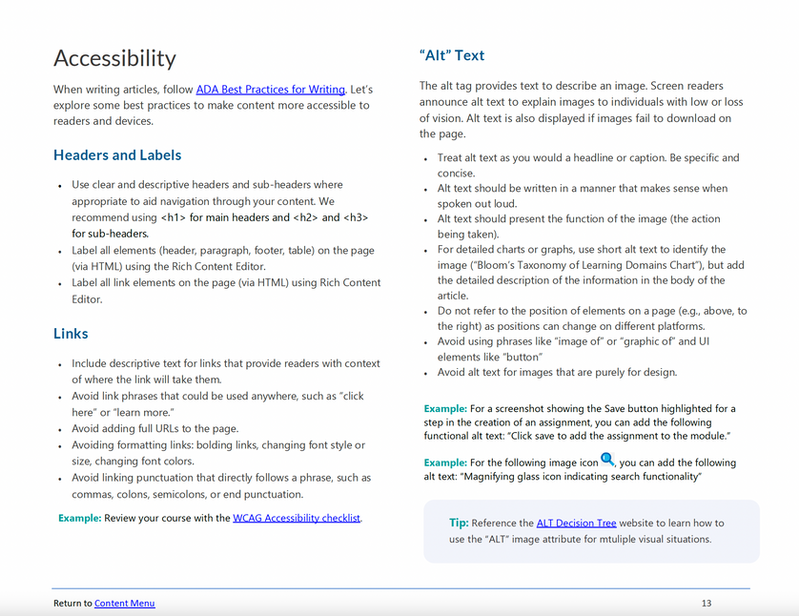

“As an instructional trainer, I help educators translate learning theory into practical application. My sessions focus on building confidence, designing accessible and engaging experiences, and cultivating reflective teaching practices that support measurable learning outcomes.”
Instructional Trainer
WCAG Challenge :
A scenario-based quiz assessing knowledge of core WCAG accessibility guidelines.
Projects
featured:
1
Case Study:
Led the implementation of WCAG 2.1 accessibility standards across all instructional media, technology platforms, and faculty training materials.
WCAG Challenge
Result:
The WCAG Accessibility Initiative established consistent accessibility practices across programs and media. It strengthened institutional awareness, increased compliance, and created sustainable systems for accessible course production.
Created an interactive Storyline sample that demonstrates how WCAG principles can be applied in an accessible quiz design (see example below).
Department-wide Adoption of WCAG
Established accessibility policy across departments and embedded compliance information within Canvas.
Accessibility Compliance
Vetted all third-party media and learning technologies to ensure compliance with WCAG 2.1 standards and active accessibility features.
Key Outcomes
Targeted WCAG Instructor Training
Developed new instructor training to guide faculty in applying accessibility principles when creating content.
Multi-media Training
Featuring before-and-after visuals, clear explanations, and step-by-step guidance for updating course materials with the new menu.
2
Case Study:
Developed an instructional video series to prepare instructors for the rollout of a new Canvas LMS menu and its impact on course navigation, content setups, and student experience.
Result:
The training videos supported a smooth transition to the updated LMS interface, reducing instructor confusion and lowering ticket reports during the rollout.
LMS Training Video
Key Outcomes:
Reduced support ticket reports during the transition
Improved Transition Efficiency
Ongoing Instructor Assistance
Developed additional supplementary knowledge base articles and ongoing support services to facilitate a smooth transition for instructors.
Instructor Knowledge
Base
Case Study:
Designed and implemented a centralized knowledge base to streamline access to institutional resources, policies, and training for instructors and administration.
Result:
The knowledge base consolidated instructional resources into one accessible system, minimized instructor confusion, organized templates and media assets, and established a sustainable framework for knowledge management.
The adjacent infographic outlines the information architecture of the Instructor Knowledge Base, illustrating its structure, taxonomy, and navigation flow.
3
Centralized Instructor Learning
Served hundreds of instructors annually through UCLA Extension’s first digital instructor learning hub.
Knowledge Base Branding System
Developed a consistent branding and design guide to unify the Knowledge Base’s visual identity and structure.
(see below)
Key Outcomes
Resource Repository
Centralized all instructor training materials, instructional resources, and multimedia assets within one accessible platform.















